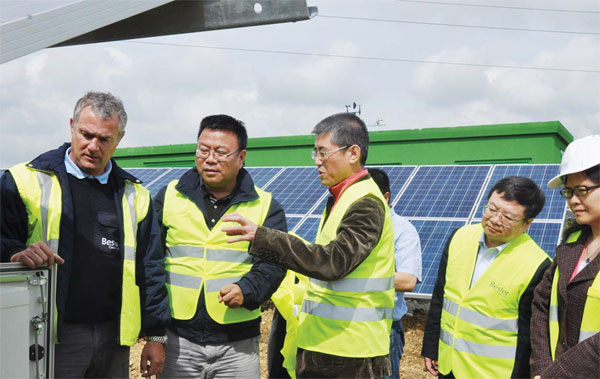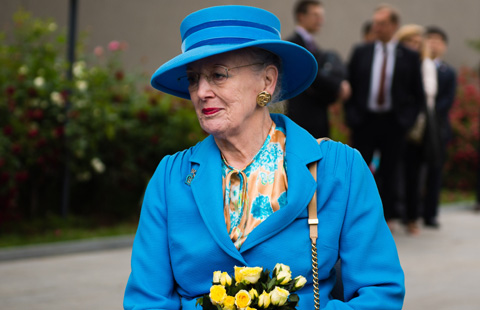Triumphal march of the sun kings
Updated: 2014-05-02 07:50
By Zhang Chunyan (China Daily Europe)
|
|||||||||||
|
Spriggs solar farm near Saffron Walden, Essex, is the first solar farm that AVIC International has invested in and built in Britain. Provided to China Daily |
Chinese company's solar success buoys it as it looks for more projects in Europe
The aerospace and defense contractor Aviation Industry Corp of China is planning to use its renewable energy investments in the UK as a springboard to expand into other European markets, company officials say.
The company's unit, AVIC International Holding Corporation, plans to build several solar power plants in Britain over the next few years, with the goal of generating around 300 megawatts of solar power.
Pan Linwu, executive vice-president of AVIC International Holding Corporation, says renewable energy will be one of the most important areas for the company.
"We would like to invest more in this industry," he says.
AVIC International turned over a 12 mW solar-powered plant to a British firm in London last week. The Spriggs solar farm, near Saffron Walden, Essex, 70 kilometers from London, has already been linked to the main grid in Britain since March. It is also the first major solar farm that AVIC International has invested in and built in the UK, and the biggest solar plant set up by a Chinese company in the country.
"The success of this project has created a good foundation for our renewable energy investments in the UK and maybe other European countries. It also helped us gain first-hand knowledge about the UK renewable energy industry."
In March last year, AVIC International purchased Spriggs Farm for about 13 million pounds ($21.9 million; 15.8 million euros). After more than a year of development and other related work, the farm has been handed over to Foresight Solar Fund Ltd, a UK-based independent infrastructure and private equity investment manager. The 50-hectare plant generates 30,000 kilowatt-hours of electricity in the summer and supplies electricity to 2,500 households, equivalent to that produced by 23 tons of coal every day.
"We constructed the solar plants with our own technology, materials and components," Pan says.
"Next month, we will start work on three new solar plants in the UK that can produce 25 mW of electricity," says Lou Yucheng, general manager of the UK operations of AVIC.
"We will use the same format as the Spriggs Farm, and if it succeeds, we will commence work on another 50 mW PV project."
State-owned AVIC International Holding Corporation was set up in 1979 during China's initial reform and opening-up policy period and is completely owned by AVIC.
With headquarters in Beijing, AVIC International reported revenue of around 150 billion yuan ($24 billion; 17.3 billion euros) in 2013. The company has more than 60,000 employees in 400 subsidiaries and is present in more than 180 countries.
Pan says AVIC International was one of the first Chinese companies that went to Britain as the opening-up policy took effect. At that time, AVIC International's space engine project helped UK firm Rolls-Royce through hard times, and gave a big boost to China's outer space technology industry.
AVIC International is now a well-diversified company, with holdings in international civil aviation, trade and logistics, retail and high-end consumer goods, real estate and hotel management, electronics manufacturing, and natural resource development.
Large state-owned enterprises from China have often pursued development through diversification, analysts say.
While some large enterprises choose to develop businesses closely related to their core business, others prefer to take the less traveled road of diversification.
AVIC International selected the new energy sector in the UK for its expansion. The company's move into renewable energy projects is also a result of China's commitment to shut coal-fired power plants and increase clean-energy production.
"We're entering a new century and a new era. People are facing threats like global warming. We must work together to protect nature and the environment. As a state-owned company, we felt that we must be at forefront of these causes," Pan says.
Britain remains a more attractive investment destination for the solar industry than most other European countries as the UK government offers better subsidies, Lou says.
England's largest solar power station is in Leicestershire and has a total capacity of 33 mW. The British government plans to increase the country's total installed generating capacity to 20 gigawatts by 2020, leading to suggestions that there will be a big increases in activity in the solar market.
Pan says that last year, 25 percent of AVIC international's revenue came from overseas markets. "We are planning to increase the international contribution to 50 percent. Globalization is our core strategy.
"We are looking to provide more renewable energy and energy efficiency solutions for the UK, China and the rest of the world," Pan says.
AVIC International also manufactures wind devices and invests in solo wind energy projects that have new ideas, new technology, and new models, Pan says.
Besides solar plants, AVIC International plans to invest in eco-flats in the UK.
George Barker, British minister of state in the department for energy and climate change, says the UK's long-term economic plan looks to develop more clean energy. Clean energy investments in the UK rose 14 percent compared with the previous year, he says without revealing any numbers.
The UK's advanced technologies and financial innovation and China's world-class manufacturing capacity make it a natural partnership between the two countries, Barker says.
Recently the British government approved eight major renewable energy projects, including offshore wind farms and conversion of coal-powered plants to run on biomass.
These eight projects will also get the government's contracts for difference rating, which in effect guarantee prices for renewable energy suppliers.
These projects could cost up to 1 billion pounds a year in subsidies, but the UK government says it will encourage firms to invest much more than that in low-carbon electricity generation.
Liu Xiaoming, Chinese ambassador to the UK, says AVIC International has created a successful new model of China-UK business cooperation.
It reflects the thriving cooperation between China and Britain in the energy sector, he says.
"The two countries already have considerable mutual investments in the petrochemicals industry. We are now discussing and preparing for cooperation in nuclear power. We also have extensive cooperation in photovoltaics, wind farms and tidal power," Liu says.
AVIC International has also signed an agreement with the London-based Sustainable Development Capital LLP for setting up the UK-China Energy Efficiency Investment Fund.
It will invest in projects with specialist technology solutions that reduce energy demand and costs, and that will result in significant reduction of greenhouse gas emissions.
The two sides are also seeking to bring the best of UK and international technologies and services to China and, with this being complemented by the expertise and skills of Chinese partners, the initiative is expected to produce impressive results.
Liu says, the agreement demonstrates the depth in China-UK investment cooperation. The areas of investment have noticeably expanded to include advanced manufacturing, finance, new energy, infrastructure and real estate.
"China's industrial base and also its retail, commercial and healthcare assets offer an enormous opportunity for energy savings," says Jonathan Maxwell, chief executive of Sustainable Development Capital LLP.
"Our alliance with AVIC is a potentially transformative opportunity to partner with a major Chinese company and the Chinese government to address one of the fastest growing sectors of the world energy market," Maxwell says.
The investments will be part of the planned $200 million UK-China Energy Efficiency Fund that will be managed by SDCL Asia.
"Energy efficiency has the potential to make a major contribution to a more cost effective, productive, resilient, resource efficient and lower carbon economy," Maxwell says.
Zhou Heran contributed to this story.
zhangchunyan@chinadaily.com.cn
(China Daily European Weekly 05/02/2014 page20)
Today's Top News
Swiss move to reveal bank accounts will help China
Chinese police to patrol in Paris
Beijing rebuffs Hanoi's oil rig claims
Key Sino-Nigerian deals signed
EU: No armed intervention in Ukraine
Chinese premier visits Nigeria
Court to rule on Yingluck in Thailand
Travellers to Malaysia drop
Hot Topics
Lunar probe , China growth forecasts, Emission rules get tougher, China seen through 'colored lens', International board,
Editor's Picks

|

|

|

|

|

|






